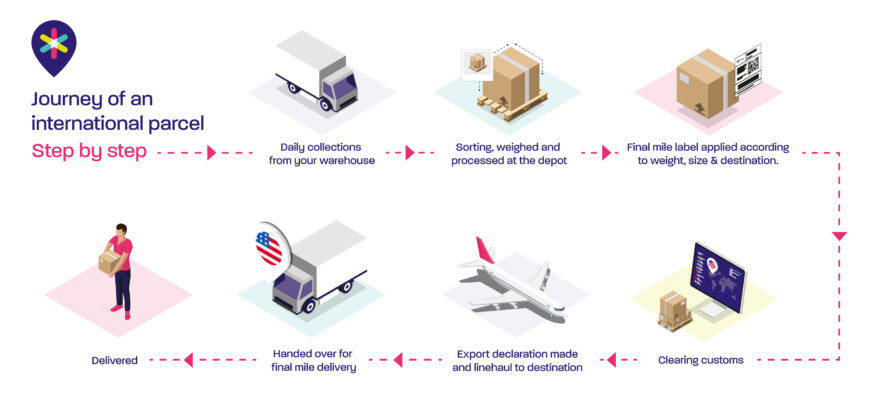A seemingly minor tweak to US import regulations is sending shockwaves through international postal services and e-commerce, forcing a re-evaluation of how goods cross borders. The era of cheap, duty-free online shopping from abroad may be drawing to a close, at least for now.
Starting August 29th, a fundamental shift in US customs policy is set to dismantle a long-standing “de minimis” rule. Previously, parcels valued under $800 could enter the United States without incurring customs duties or taxes. This preferential treatment was a cornerstone of modern cross-border e-commerce, enabling a deluge of inexpensive goods to flow directly from international sellers to American consumers. Now, the landscape is dramatically altered, placing the onus of duty payment squarely on postal operators before parcels even touch US soil.
The End of an Era: What Changed?
The core of the issue lies in the abolition of the $800 de minimis threshold. This isn`t just a simple adjustment; it`s a structural change that demands a new operational paradigm. Under the new rules, international postal services are now obliged to calculate, collect, and pay customs duties on almost every incoming parcel, regardless of its value, prior to its arrival in the US. The only remaining exception is for gifts valued under $100.
This policy, often colloquially termed a “Trump tariff,” was initially conceived with a specific target in mind: the burgeoning tide of cheap imports, particularly from China, fueled by e-commerce giants like Shein and Temu. The intention was to level the playing field for domestic manufacturers and retailers. However, as is often the case with broad trade policies, the ripple effects are proving to be far more extensive than anticipated.
Global Disruption: A Looming Postal Collapse?
The immediate fallout has been a chorus of alarm and, in some cases, outright suspension of services. Across Europe and Asia, postal operators are grappling with the sheer complexity and administrative burden of the new regulations. Countries reporting significant disruptions include:
- Europe: Finland, Norway, Sweden, France, Germany, and Belgium have announced they are either halting or severely restricting parcel shipments to the US.
- Asia: South Korean and Singaporean postal services have limited their offerings, with Korea Post only handling documents and letters, while parcels are redirected to a premium service where the recipient bears the cost. Japan has warned of potential delays or even the return of parcels.
This widespread cessation or limitation of services has prompted the global press to ponder a “postal collapse.” Bloomberg highlights the “confusion” among operators struggling to process millions of inexpensive parcels that will soon be subject to duties. Financial Times points out that the previous de minimis regime was a “gift” to direct-to-consumer e-commerce, and its removal now threatens problems “far beyond” its original scope targeting Chinese imports.
The Operational Conundrum
Imagine the logistical nightmare: millions of parcels, each requiring individual assessment, duty calculation, and pre-payment. Postal services, traditionally designed for bulk mail and package delivery, are ill-equipped for this level of granular financial processing at scale. Many lack the IT infrastructure, trained personnel, and legal frameworks to implement such a system quickly and efficiently. It`s akin to asking a freight train to suddenly start weighing and ticketing each individual grain of sand in its cargo.
Economic Implications and the Consumer Impact
The new duty rates are significant. Goods produced in the European Union, for instance, are now subject to an approximate 15% duty. Chinese goods face an even steeper 30% tariff, at least until November 9th, when the current trade truce between the US and China is set to expire. These duties, when passed on to the consumer, will inevitably lead to higher prices for goods purchased internationally, potentially reducing consumer choice and slowing the growth of cross-border e-commerce.
For European postal services, the timeline for adaptation has been brutally short. France24 notes that the French postal service alone ships approximately 1.5 million parcels to the US annually, leaving little time to overhaul their entire system to accommodate the new requirements.
Adaptation Amidst Chaos: A Glimmer of Hope?
While many operators have paused services, some are working furiously to adapt. The UK`s Royal Mail, for instance, is reportedly developing a new delivery system to comply with the regulations, hoping to launch it within days. Such efforts highlight the immense pressure on these organizations to maintain vital international links while navigating complex and rapidly changing trade policies.
The Future of Cross-Border E-commerce
This move by the US Customs and Border Protection fundamentally alters the economics of international parcel delivery. While the intent may have been to protect domestic industries and capture more revenue from imports, the immediate consequence is widespread disruption, increased costs, and logistical chaos. For consumers, it means potentially fewer choices, longer delivery times, and higher prices for items sourced from overseas. For businesses, it represents a significant hurdle in reaching the lucrative American market.
The situation underscores the delicate balance in global trade and how a single policy adjustment can have cascading effects across continents. As the dust settles, the international postal and e-commerce landscape will undoubtedly look very different, forcing a new era of strategic adaptation and, perhaps, more localized production or alternative shipping models. The $800 threshold may be gone, but its impact will resonate through shipping manifests and online shopping carts for the foreseeable future.








